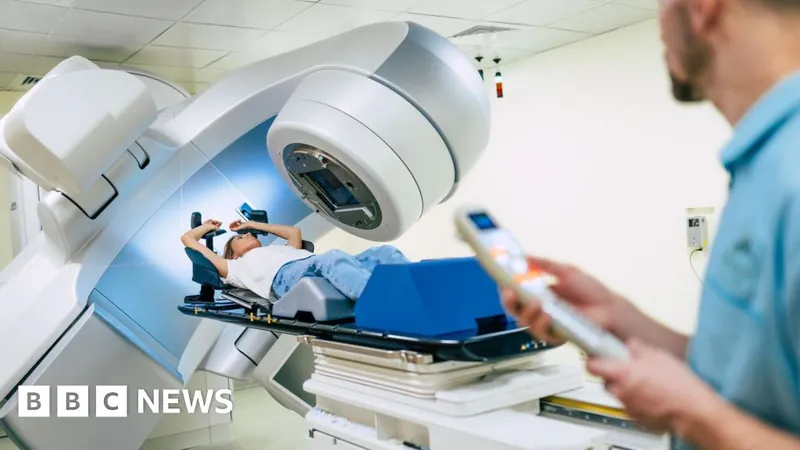
Patients Face Postcode Lottery for Life-Saving Cancer Treatments, Doctors Warn
2025-09-11
Author: Siti
Bureaucracy Blocks Access to Essential Treatments
Senior cancer specialists are sounding the alarm about a growing crisis in England's healthcare system, where excessive bureaucracy is preventing patients from accessing the latest cancer treatments. The Royal College of Radiologists (RCR) warns that the cumbersome funding application process is hampering innovation and creating a disturbing postcode lottery in cancer care.
While the government promises a new cancer strategy this autumn aimed at revitalizing the National Health Service's (NHS) reputation as a leader in global cancer care, experts argue that the current situation is unjust.
A Golden Age for Cancer Treatment?
Despite these challenges, many doctors believe we are in a golden age of cancer treatment, marked by groundbreaking advancements such as immunotherapy and improved radiotherapy techniques. These innovations have significantly boosted survival rates for various common cancers.
However, the RCR emphasizes that patients risk missing out on crucial treatments due to NHS bureaucracy. For instance, even established methods like Stereotactic Ablative Body Radiotherapy (SABR)—used to precisely target small tumors—remain difficult to access. Each cancer unit must individually apply for funding, leading to unequal treatment availability.
An Inequitable System
Dr. Nicky Thorp, vice president for clinical oncology at the RCR, condemns this situation as inequitable and incompatible with the principles of the NHS. There is a widespread call from medical professionals for the government to streamline funding processes and listen to clinician recommendations.
Both the RCR and the Society of Radiographers have urged the government to simplify access to SABR and other innovative treatments, including certain immunotherapy drugs and molecular radiotherapy.
A Life-Saving Success Story
One patient, Ray Bowen, 76, from Middlesborough, is grateful for the advancements in treatment. After his cancer returned in 2022, he was faced with dire prospects until he received SABR radiotherapy, which has successfully treated his condition. "It's a magic treatment that needs to be more available," he says, reflecting on the stark contrast to what was possible just a few years ago.
Looking Ahead: The Upcoming Cancer Strategy
This urgent appeal for change coincides with the expected release of the UK’s cancer strategy later this year. Cancer Research UK highlights the need for earlier diagnoses, noting that only 50% of cancer patients receive a diagnosis within the target 28 days after an urgent referral.
For certain types of cancer, the figures are even more concerning: only about a third of patients receive timely diagnoses. In contrast, the majority of those who undergo urgent tests and don’t have cancer receive the good news promptly.
Michelle Mitchell, chief executive of Cancer Research UK, expresses hope but also concern: "It's promising that more people are being reassured they don’t have cancer on time. However, it’s unacceptable that half of cancer patients are not being diagnosed within the target timeframe."
The diagnostic process remains slow, unnecessarily delaying treatment. Jon Shelton from Cancer Research UK insists that tests need to be expedited to ensure prompt care for all cancer patients.


 Brasil (PT)
Brasil (PT)
 Canada (EN)
Canada (EN)
 Chile (ES)
Chile (ES)
 Česko (CS)
Česko (CS)
 대한민국 (KO)
대한민국 (KO)
 España (ES)
España (ES)
 France (FR)
France (FR)
 Hong Kong (EN)
Hong Kong (EN)
 Italia (IT)
Italia (IT)
 日本 (JA)
日本 (JA)
 Magyarország (HU)
Magyarország (HU)
 Norge (NO)
Norge (NO)
 Polska (PL)
Polska (PL)
 Schweiz (DE)
Schweiz (DE)
 Singapore (EN)
Singapore (EN)
 Sverige (SV)
Sverige (SV)
 Suomi (FI)
Suomi (FI)
 Türkiye (TR)
Türkiye (TR)
 الإمارات العربية المتحدة (AR)
الإمارات العربية المتحدة (AR)